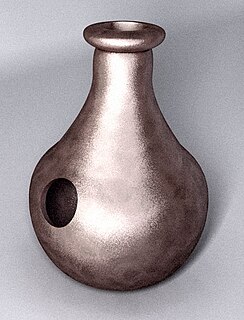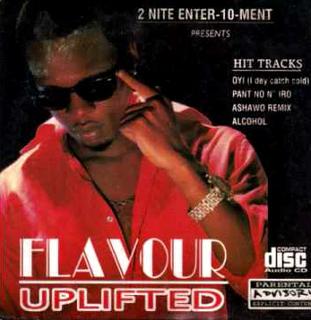Highlife is a music genre that originated in present-day Ghana early in the 20th century, during its history as a colony of the British Empire. It uses the melodic and main rhythmic structures of traditional Akan music, but is played with Western instruments. Highlife is characterised by jazzy horns and multiple guitars which lead the band. Recently it has acquired an uptempo, synth-driven sound.

The music of Nigeria includes many kinds of folk and popular music, some of which are known worldwide. Styles of folk music are related to the multitudes of ethnic groups in the country, each with their own techniques, instruments, and songs. Little is known about the country's music history prior to European contact, although bronze carvings dating back to the 16th and 17th centuries have been found depicting musicians and their instruments. The largest ethnic groups are the Igbo, Hausa and Yoruba. Traditional music from Nigeria and throughout Africa is almost always functional; in other words, it is performed to mark a ritual such as a wedding or funeral and not to achieve artistic goals. Although some Nigerians, especially children and the elderly, play instruments for their own amusement, solo performance is otherwise rare. Music is closely linked to agriculture, and there are restrictions on, for example, which instruments can be played during different parts of the growing season.

Atani is a city on the eastern bank of the Niger River in Anambra State, Nigeria. It was a town populated by early fishermen and migrant settlers. Atani is still the rice, fish, yam and cassava basin of Anambra state, producing most of the food sold in many markets in Delta and Anambra States. Atani is believed to possess commercial quantities of unexploited crude oil. The population has grown to an estimated 230,000.
Rex Jim Lawson, known as Cardinal Rex, was a singer, trumpeter and bandleader from New Kalabar, Nigeria. He became one of the best-known highlife musicians of the 1960s in Africa when Cardinal and his band dominated Nigeria's highlife scene.

Igbo music is the music of the Igbo people, who are indigenous to the southeastern part of Nigeria. The Igbo traditionally rely heavily on percussion instruments such as the drum and the gong, which are popular because of their innate ability to provide a diverse array of tempo, sound, and pitch. Igbo music is generally lively, upbeat, and spontaneous which creates a variety of sounds that enables the Igbo people to incorporate music into almost all the facets of their daily lives. Some very popular Igbo music styles are Igbo highlife, Igbo rap, Odumodu.
Ogbaru(Official name) Native names is a Local Government Area in Anambra State, south-central Nigeria, an Igbo land subgroup. Towns that make up the local government are Atani, Akili-Ogidi, Akili-Ozizor, Amiyi, Mputu, Obeagwe, Ohita, Odekpe, Ogbakugba, Ochuche Umuodu, Ossomala/ Ossomari, Ogwu-aniocha, Umunankwo, Umuzu, Okpoko, Ogwu Ikpele. Ogbaru has its local government headquarters in Atani. Ogbaru People are traditional fisher-people, farmers as well as known warriors from its history. The Ogbaru people also share clan lineage and boundaries with its people in delta state and rivers state such as Asaba in delta state and Ndoni in rivers state. The Ogbaru people consider River Niger waters that runs through its lands as their territorial lands. Ogbaruland is neighbored by Onitsha, a major commercial city in south eastern Nigeria located in Anambra State in Nigeria. Ogbaru people and clan are stretched into three Nigerian states, namely Anambra State, Delta State and Rivers State in Nigeria.Ogbaru was a food basket in biafra country,during the nigerian civil war and post civil war.Ogbaru has notable people such as Atamanya Okwesa.( a king of ossomala kingdom in the 1800s ), Omu Okwei, a female industrious lady from ossomala kingdom in early 1900s), Professor Ben Nwabueze,Chief David Egonu of Dunon Furniture Company(First furniture company in the South East of Nigeria). Chief Luke Obi. MNI.. Prof Ben Akpati, Diplomat, politician and Author, Oseloka H. Obaze, Senator Stella Odua, Rt. Hon. Princess Chinwe Clare Nwaebili, Chief Daniel Obi Okolie, retired Banking Executive,Late Chief Stephen Osita Osadebe, a world-renowned and acclaimed high life musician, Late Prof. Francis Awogu; Former Justice court of Appeal, Chief Patrick Sule Ugboma; billionaire industrialist,Dubem Obaze; a politician and formal commissioner chieftaincy and L.G Chief. Tony Anayo Mbanefo; Engineer and Business Executive. Also, Late Chief Obiajulu Osadebe, a musical protégé of his earlier mentioned father, Felix Awogu; Sports personality/General Manager Supersports West Africa, Austin Nwaebili; a silent billionaire pilot and philanthropist, Chief Victor Olasoji Ikechukwu Obi; a son of Late Chief Luke Obi of Ossomari Kingdom,a supplier and global shipper and the only one to ship containers from North Korea to Africa in early 2000s, via approval of his uncle and president olusegun obasanjo and also HRM Okakwu Victor Awogu; renown Journalist and reigning Atamanya of Ossomala Kingdom. Ogbaru today has a Nigerian Naval Base, an Industrial river harbor, a refinery, a federal road under-construction leading to Rivers State in Nigeria. Ogbaru is also a projected link road to other parts of the south east / south south zones of Nigeria with construction of a more inland link roads and a proposed 2nd Niger Bridge. Ogbaruland is very strategic to its surrounding region and Nigeria and West Africa(Africa) as a whole.
Christogonus Ezebuiro Obinna, alias Dr. Sir Warrior, was the leader of the Oriental Brothers International Band which was famous in the Nigerian Igbo highlife music scene for several decades. He performed primarily in Nigeria, as well as performing internationally in places such as London and the United States of America with his crew. Originally, the founder of the group is Ferdinand Emeka Opara.

Chief Stephen Osita Osadebe, often referred to as just Osadebe, a Nigerian highlife musician from Atani. His career spanned over 40 years, and he is one of the best known Igbo highlife musicians and king of highlife music. His best-known hit was the 1984 single "Osondi Owendi", which established him as a leader in the highlife genre and was one of Nigeria's most popular records ever.
Nnamdi Moweta, is a radio personality, music producer, music supervisor, music promoter and consultant. He is the host of Radio Afrodicia, a radio show on KPFK, a listener-sponsored radio station based in Los Angeles, California. With an audience of approximately 50,000 listeners weekly, Moweta is the only African-born radio host in Los Angeles, California. In 2011, Moweta was featured on Reuters Africa Journal segment about African DJs in the United States.

Blessed is the third studio album by Nigerian singer Flavour N'abania. It was released on October 18, 2012, by 2nite Entertainment. The album features guest appearances from Wizboyy and Fally Ipupa. Its production was handled by Masterkraft, Wizzboy, Selebobo, MJay, Del B, J Stunt and Dekumzy. The album was supported by the singles "Kwarikwa (Remix)", "Baby Oku", "Shake", "Chinny Baby" and "Ada Ada". Flavour celebrated the album's release at 2nite, a night club he opened in Enugu State. He invited Tiwa Savage, Iyanya, Kcee and Bracket to attend the club's grand opening.

Uplifted is the second studio album by Nigerian singer Flavour N'abania. It was released on July 20, 2010, by Obaino Music and 2nite Entertainment. The album features guest appearances from Jay Dey, Oloye, Stormrex, Waga Gee, Asemstone, M-Jay, V.I.P and Elense. It was supported by four singles: "Nwa Baby", "Oyi ", "Adamma" and "Odiro Easy".

"Flavor" is a song recorded by Nigerian recording artist Iyanya for his second studio album, Desire (2013). It was released as the record's third commercial single on 10 November 2012 through Made Men Music Group, a record label he co-owns with his manager, Franklin Ube. Written by the singer and produced by long-time collaborator D'Tunes, "Flavor" is a highlife and pop-influenced song. It features Iyanya questioning his lover through repetitive lyrics.

Jidenna Theodore Mobisson, better known mononymously as Jidenna, is an American rapper, singer, songwriter and record producer from Imo State, Nigeria. In 2015, Jidenna released two singles, "Classic Man" and "Yoga", promoting Janelle Monáe's label Wondaland Records' compilation EP The Eephus with Epic Records. His debut album, The Chief was released on February 17, 2017 and peaked at number 38 on the Billboard 200.

No Guts No Glory is the debut studio album by Nigerian rapper Phyno. It was released by Sputnet Records and Penthauze Music on March 20, 2014. The album features guest appearances from P-Square, Omawumi, Olamide, Stormrex, Efa, Flavour N'abania, Runtown, Ice Prince, M.I, Mr Raw, Timaya and Illbliss. Phyno enlisted Major Bangz, WizzyPro, Chopstix and JStunt to assist with production. Initially scheduled for release in November 2013, the album was strategically postponed in order to capitalize on the downtime of the Nigerian Music Industry during the first quarter of the year. No Guts No Glory was supported by four singles: "Ghost Mode", "Man of the Year", "Parcel" and "O Set". It was primarily recorded in Igbo and Nigerian Pidgin. Critical reception to the album was generally positive, with many critics commending its indigenous sound and lyrical depth.
Igbo rap is a Nigerian style of hip hop music that originated in the Igbo-dominated southeastern region of Nigeria and has become more popular since 2000. The style draws its main influences from Igbo traditional music and African American music. Aside other derived styles, it can be combined with highlife, R&B and afro-soul. Most artists and groups who perform Igbo rap usually deliver their lyrics in the Igbo language, although on some occasions, Igbo is blended with Pidgin English.
Igbo highlife is a contemporary musical genre which combines highlife and Igbo traditional music. It first started off in the southeast region of Nigeria, during the 1950s. The genre is primarily guitar-based music, with rare characteristic blend of horns and vocal rhythms. Igbo highlife lyrics are sung mostly in Igbo with occasional infusion of Pidgin English. One of the most influential composers and performers of the music is Chief Stephen Osita Osadebe whose career spanned over 40 years. Osadebe's discography comprises numerous popular songs including the 1984 hit "Osondi Owendi" which launched him on the world stage as a pioneer of the Igbo highlife genre.
Emmanuel Ebuka Osadebe is an Irish professional footballer who plays for Macclesfield Town.









